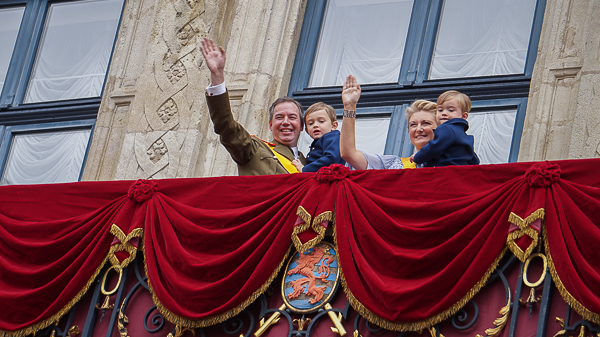 Credit: Jazmin Campbell, Chronicle.lu
Credit: Jazmin Campbell, Chronicle.lu
The big national event in Luxembourg this year was the "Trounwiessel" (throne change), marking the abdication of Grand Duke Henri in favour of his eldest son, the new Grand Duke Guillaume.
This was a rare, historic and symbolic moment - the last such transition took place a quarter of a century ago, in October 2000, when Grand Duke Henri succeeded his father, Grand Duke Jean.
On Friday 3 October 2025, Guillaume was sworn in as Grand Duke during a formal ceremony in the Chamber of Deputies (parliament), following his father's abdication earlier that day at the Grand Ducal Palace. It was a voluntary and celebratory handover symbolising both continuity and change, and one I had the opportunity to cover as a journalist alongside hundreds of media representatives, many of whom had travelled from abroad to witness the occasion. The festivities continued over the weekend - but more on this later.
For context, Luxembourg is a parliamentary democracy in the form of a constitutional monarchy. The world's only grand duchy, it recognises a hereditary monarch as its head of state. Despite being largely ceremonial, the role of reigning Grand Duke or Grand Duchess still carries symbolic and diplomatic weight.
Unlike the United Kingdom, where monarchs typically reign for life, Grand Duke Henri's abdication was framed as an act of generational renewal and a time for change. The new Grand Duke Guillaume embodies a more contemporary image: approachable, family-oriented and fluent in the languages and values of modern Luxembourg - notably, he has long been involved in the Scouts and committed to economic endeavours.
With all the recent talk of renewal and a new chapter for Luxembourg, however, the question remains: can a monarchy - a system where power and privilege are traditionally inherited rather than earned - truly be modern?
Like other royal families (though perhaps to a lesser extent), Luxembourg's Grand Ducal family has not escaped scandal over the years. During the First World War, Grand Duchess Marie-Adéläide sparked controversy over her perceived pro-German tendencies and political interference. She ultimately abdicated in 1919 in favour of her sister, Charlotte (Guillaume's great-great-grandmother). That same year, a national referendum saw the majority of voters elect to retain the monarchy under Grand Duchess Charlotte.
More recently, in 2008, Grand Duke Henri refused to sign a bill legalising euthanasia, resulting in a constitutional amendment that removed the sovereign's legislative powers - the Grand Duke no longer needed to approve such bills, but merely to promulgate them. The 2020 Waringo report later called for greater transparency and modernisation within the royal household. With Guillaume being the first Grand Duke to be sworn in since these changes took effect, he has clearer rules to follow and must adapt to the realities of a rapidly changing and increasingly uncertain world.
Grand Duke Guillaume touched on this in his inaugural address to the Chamber of Deputies, where he spoke of tradition but also the need for the monarchy to "evolve with the times and remain oriented toward the future". He pledged to "build bridges between generations, between tradition and innovation". The next day, after a nationwide tour (involving visits to Grevenmacher, Steinfort, Dudelange and Wiltz over one day), the new Grand Duke echoed this message before a crowd at Glacis: "Let the music be a bridge to our vision of Luxembourg: talented, creative and welcoming [...] Tonight we are not celebrating a person, but our identity, our diversity, our history and our future". Delivered in Luxembourgish, English and French, his remarks reflected not only his personal tone and vision but also the multilingual, multicultural identity of modern Luxembourg.
Grand Duke Guillaume has also taken small but symbolic steps to modernise perceptions: when he was still Hereditary Grand Duke, he and his wife confirmed they were using their own funds to finance an annex at Colmar-Berg Castle to create a more "normal" family home in which they could raise their children, Prince Charles (born 2020) and Prince François (born 2023).
Nevertheless, the monarchy continues to face scrutiny over its costs and relevance in the modern world. The Maison du Grand-Duc's 2024 activity report, published in June 2025, revealed that the monarchy cost taxpayers almost €19.4 million last year - up from €18.6 million in 2023 and €15.7 million in 2022. The "Trounwiessel" festivities themselves added a notable one-off expense: an official financial report released on Monday 20 October 2025 revealed that the celebrations cost over €8.6 million, although much of this went to supporting local artists and service providers. As when the international media arrived in force for Guillaume and Stéphanie's wedding in 2012, one could argue that this expenditure was an investment in projecting the Grand Duchy abroad, not just nationally. For a small state with an increasing risk of poverty, however, such figures inevitably spark public debate - and yet, there are no signs of Luxembourg shifting towards a republic any time soon.
Critics argue that hereditary privilege is incompatible with modern democratic values. Supporters counter that the monarchy provides continuity, stability and valuable soft power - a message that dominated during the "Trounwiessel" festivities.
According to the Politmonitor survey earlier this year, two-thirds of voters agreed a parliamentary monarchy remained the best form of state for Luxembourg, while one in five said they did not want a monarchy.
Tourism and national branding may play a role here, with the monarchy adding cultural and diplomatic value and remaining a quiet source of pride for many citizens; others appear indifferent rather than outright opposed. Beyond symbolism, the Grand Ducal family is also engaged in charitable and social causes: the new Grand Duchess will chair the recently established Fondation Grand-Duc Guillaume et Grande-Duchesse Stéphanie, which aims to support disadvantaged people through social action, promote inclusion for people with disabilities and encourage artistic creation. Such activities help maintain the monarchy's relevance and connection to everyday life in the Grand Duchy.
Still, the question remains whether the monarchy can continue to evolve in step with society. If Grand Duke Guillaume succeeds in his mission to "build bridges", he may well redefine what a modern monarchy can mean. And perhaps, in the end, Luxembourg's monarchy will endure precisely because it has learned to adapt, evolve and renew itself.









